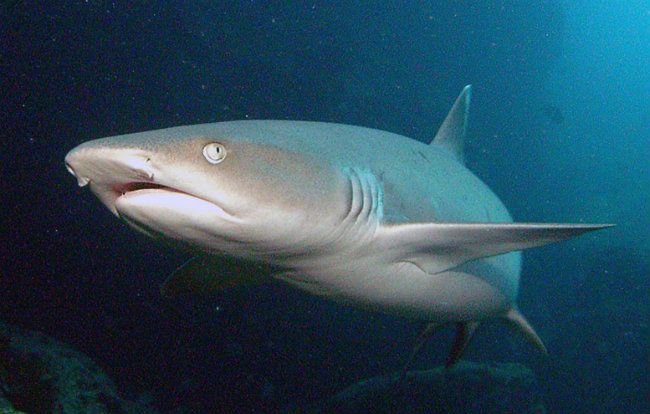Sharks have long been seen as voracious predators and misunderstood sea creatures, but one role they're rarely cast in is as peaceful sleepers.
Video taken in Revillagigedo, Mexico, in the waters off the country's Pacific coast, just might prove otherwise. During a dive organized by Quebec-based company Scubacadémie, divers captured footage of whitetip reef sharks huddled together on the ocean floor near an underwater cave. Some appear to fidget about while others lie completely motionless. The large pile of sharks appears to be roughly 20 strong and unbothered by nearby human presence.
While the scene may appear odd to the untrained marine enthusiast, the arrangement is quite common.
 !
!
Even with the constant study and observation there are still things about the kings of the ocean that we don’t know or argue about. The list of disputed shark facts and theories could go on forever, and this is partially due to the fact that humans have only been whole-heartedly studying sharks for around 40 or 50 years. Before that, studying sharks was left to the adventure seekers and the few marine biologists willing to brave the waters of the world’s oceans.
If you believe the Discovery Channel, the movie Jaws changed all that though. If you watched “How Jaws Changed the World” during Shark Week this year you would have learned that the Steven Spielberg smash not only created an irrational fear of sharks, but it also created a substantial increase the study of marine science across the globe. In essence, a movie designed to instill fear of sharks actually lead to an increased love for the animals.
The Big Question: Do Sharks Sleep?
Despite this drastic increase in the study of sharks and the invention of an entire week dedicated to them on television, there are still things we don’t fully understand about sharks. One of the most widely disputed nuances of sharks is if they sleep or not. That’s right, scientists across the globe have been arguing for the past few decades over if sharks catch some “zzzzz” or not.
The root of the problem stems from how sharks breath. Sharks are intriguing animals in that in order for them to process oxygen, water must continually pass through their gills and into your body. Seeing that sharks don’t have the luxury of fans to blow water into their gills, they must constantly move so that water passes through their gills. At least this is one of the theories.
A problem with this theory arose when marine biologists began to study the Nurse Shark in more detail. When observed in their natural environment Nurse Sharks were seen to remain motionless or “resting” on the bottom of the ocean floor. This initially alarmed scientists until they dug deeper.
Other shark species, such as whitetips, stay completely immobile to rest. Spiracles, or small holes, force water across their gills.
Despite the large gathering of sharks seen in the video, whitetip sharks aren't particularly social.
They're known to be loners, but are rarely territorial, meaning they willingly congregate in spots that are generally appealing. Caves and crevices where sharks can find shelter from larger predators are common gathering spots.
"These sharks rest in groups during the day, often close together under ledges or in small caves, then scour the reef in packs at night to hunt," said Caitlin Scully, a spokesperson for the Birch Aquarium at the Scripps Institution of Oceanography. "Though they travel together, they are usually seen hunting individually rather than cooperatively."!
Not indicating that the content you copy/paste is not your original work could be seen as plagiarism.
Some tips to share content and add value:
Repeated plagiarized posts are considered spam. Spam is discouraged by the community, and may result in action from the cheetah bot.
Creative Commons: If you are posting content under a Creative Commons license, please attribute and link according to the specific license. If you are posting content under CC0 or Public Domain please consider noting that at the end of your post.
If you are actually the original author, please do reply to let us know!
Thank You!
More Info: Abuse Guide - 2017.
Hi! I am a robot. I just upvoted you! I found similar content that readers might be interested in:
https://news.nationalgeographic.com/2017/08/whitetip-reef-sharks-sleeping-mexico-video-spd/